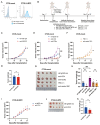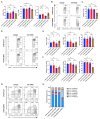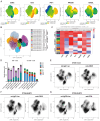Ectopic ULBP2 Is Associated with Decreased NKG2D Expression in CD8+ T Cells Under T Cell-Modulatory Conditions in a Murine Tumor Model
- PMID: 40558520
- PMCID: PMC12191310
- DOI: 10.3390/cells14120893
Ectopic ULBP2 Is Associated with Decreased NKG2D Expression in CD8+ T Cells Under T Cell-Modulatory Conditions in a Murine Tumor Model
Abstract
UL16-binding protein 2 (ULBP2), a ligand for the activating receptor NKG2D, plays a dual role in tumor immunity, promoting immune activation or suppression, depending on the context. To investigate its impact on CD4+CD25+ T cell-targeted immunotherapies, we used a syngeneic CT26 colon cancer model engineered to express ULBP2 and compared tumor growth and tumor-infiltrating lymphocyte (TIL) profiles in control and ULBP2-expressing tumors treated with anti-CD4, anti-CD25, or anti-CTLA-4 antibodies. Tumor growth was uniformly assessed on day 21 post-transplantation, and TIL analysis was performed in groups with evaluable residual tumors. Anti-CD4 antibody significantly suppressed tumor growth in mock-transfected tumors, while no significant suppression was observed in ULBP2-expressing tumors. Anti-CD25 antibody had limited efficacy in mock tumors and tended to promote tumor growth in ULBP2-expressing tumors. Following these treatments, ULBP2 expression was associated with reduced NKG2D expression in CD8+ effector memory T cells, particularly PD-1high subsets. In contrast, anti-CTLA-4 antibody treatment induced marked tumor regression irrespective of ULBP2 expression. These findings suggest that ULBP2-NKG2D signaling may contribute to altered CD8+ T cell phenotypes under T cell-modulatory conditions, potentially impacting the outcome of CD4+CD25+ T cell-targeted therapies and providing insights for optimizing immunotherapeutic strategies.
Keywords: CD4+ T cell depletion; CD4+ T cells; NK cells; NKG2D; NKG2D ligands; Treg; ULBP2; cancer immunotherapy; immune checkpoint inhibitor; tumor immunology.
Conflict of interest statement
The authors declare no conflicts of interest.
Figures








References
MeSH terms
Substances
Grants and funding
LinkOut - more resources
Full Text Sources
Research Materials

